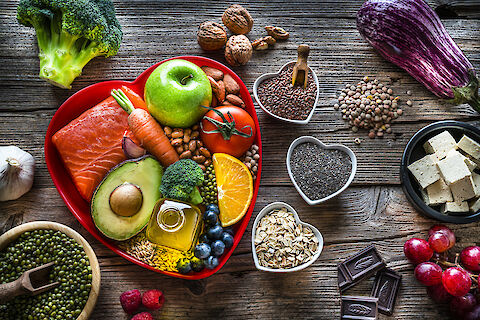
As a caregiver, ensuring the well-being of your loved one includes promoting heart health through a balanced diet. Fats play a crucial role in cardiovascular health, but not all fats are created equal. Understanding the different types of fats and their impact on heart health is essential for caregivers to make informed dietary choices.
Types of Fats and Their Impact on Heart Health
Fats are nutrients that supply energy, support cell growth, protect organs, and help the body absorb specific vitamins. They are classified into several types based on their chemical structure and impact on health. While they naturally occur in food, their impact on heart health distinguishes between good and bad fats.
Good Fats
Monounsaturated Fats
Monounsaturated fats are liquid at room temperature and become solid when chilled. They are found in olive oil, canola oil, avocados, nuts, and seeds. Monounsaturated fats can help lower LDL cholesterol levels and reduce the risk of heart disease when consumed as part of a balanced diet.
Polyunsaturated Fats
Polyunsaturated fats are also liquid at room temperature and include omega-3 and omega-6 fatty acids. They are found in fatty fish (such as salmon, mackerel, and trout), flaxseeds, chia seeds, walnuts, and soybean oil. Omega-3 fatty acids have anti-inflammatory properties and can help lower the risk of heart disease.
Bad Fats
Saturated Fats
Saturated fats are solid at room temperature and are primarily found in animal products such as red meat, poultry skin, and full-fat dairy products. They can also be found in certain plant-based oils, such as coconut oil and palm oil. Consuming high amounts of saturated fats can raise LDL (bad) cholesterol levels and increase the risk of heart disease.
Trans Fats
Trans fats are formed through a process called hydrogenation, which converts liquid vegetable oils into solid fats. They are commonly found in processed foods such as margarine, baked goods, fried foods, and snack foods. Trans fats raise LDL cholesterol levels and lower HDL (good) cholesterol levels, increasing the risk of heart disease.
Incorporating Beneficial Fats Into a Senior's Meal Plan
Adding good fats into a senior's meal plan begins with identifying foods rich in these fats. Read food labels to identify sources of unhealthy fats and choose products with less saturated and trans fats. Opt for cooking oils like olive oil, avocado oil, and canola oil to prepare meals, as they contain heart-healthy monounsaturated fats. Include fatty fish, such as salmon or mackerel, at least twice a week, which provides essential omega-3 fatty acids, which support heart health and reduce inflammation. Snacks rich in nuts and seeds, such as almonds, walnuts, flaxseeds, and chia seeds, offer additional heart-healthy fats and essential nutrients.
Everyday Caregiving: Tips for Managing a Heart-Healthy Diet
Maintaining a heart-healthy diet for seniors is about the food on their plate, consistency, and routine. Establish a regular eating schedule to avoid skipping meals or overeating. Resistance to dietary changes is common among seniors, but explaining the benefits of a heart-healthy diet can help. Encourage them to participate in meal planning and preparation.
Alongside diet, regular check-ups and exercise are vital to heart health. Regular check-ups can detect early signs of heart disease, and physical activity helps maintain a healthy weight, a critical factor in heart health.
You Can Count on Our Support
Not all fats are created equal. While bad fats can harm heart health, good fats play a critical role in maintaining it. A heart-healthy diet plays a crucial role in preventing heart disease and promoting overall cardiovascular health. By understanding the different types of fats and their impact on heart health, caregivers can make informed dietary choices for their loved ones and help them maintain a healthy heart for years to come.
If you reside in Charlottesville, Harrisonburg, Bridgewater, or Crozet and need support in managing the diet of your senior loved ones, Senior Helpers Blue Ridge wants to help. We invite you to contact ustoday. We would love to talk to you about our services for seniors and their caregivers, like Personal Care and Transitional Care.